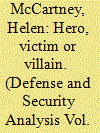| Srl | Item |
| 1 |
ID:
104149


|
|
|
| 2 |
ID:
095070


|
|
|
|
|
| Publication |
2010.
|
| Summary/Abstract |
Is the British civil-military contract strained to breaking point? The contemporary portrayal of British civil-military relations is bleak, with academics, politicians, the media and military charities arguing that military-societal relations are in urgent need of repair. Through assessing the extent to which the reciprocal expectations of the armed forces and the British public are realized, this article will argue that the moral contract, although under stress, is not breaking. Underlying social trends and the use of doctrinal concepts such as the military covenant have, combined with recent operations in Iraq and Afghanistan, altered the expectations of both sides causing tensions within military-societal relations. Yet, while the armed forces do harbour unrealized expectations of the British public who are unwilling or unable to support the use of the military in recent conflicts, neither the public nor the military is so disillusioned with the performance of the other for the relationship to be described as breaking or broken.
|
|
|
|
|
|
|
|
|
|
|
|
|
|
|
|
| 3 |
ID:
103292


|
|
|
|
|
| Publication |
2011.
|
| Summary/Abstract |
The US and British armies have faced intelligent and adaptive enemies in Iraq and continue to do so in Afghanistan. While both armies have proved adept at fighting high-intensity conflict, their initial performance against asymmetric threats and diffuse insurgencies in Iraq and Afghanistan demonstrated how much each army had to learn about conducting counterinsurgency operations. This article examines one important means by which the US and British armies have transformed themselves into more flexible and responsive organizations that are able to harness innovation at the front effectively. It traces the development of the lessons-learned systems in both armies from the start of counterinsurgency operations in Iraq to today. These changes have resulted in significant development within the organization of both armies. Reform of US and British army learning capabilities offers an important insight into the drivers of military change. The reformed lessons-learned systems have been better integrated into training, experimentation, and doctrine and force development. While there are still challenges to be overcome, both armies have created robust structures that facilitate the movement of knowledge from recent experience at the front to the rest of the organization. As such, these reforms provide us with a useful case-study that enhances our understanding of the role of 'bottom-up' initiatives in military innovation.
|
|
|
|
|
|
|
|
|
|
|
|
|
|
|
|